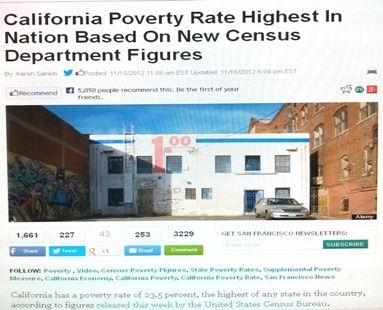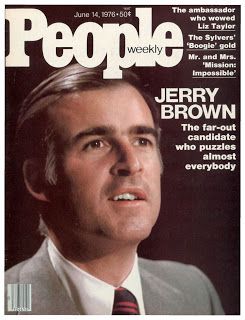If CA a template for U.S. on income inequality, U.S. is doomed

 Exaltation of Gov. Jerry Brown — normally more an East Coast media thing than a California thing — has found a home in the Los Angeles Times. The paper carried a news analysis piece with this headline: “Gov. Brown sees his ambitious agenda as a template for nation.”
Exaltation of Gov. Jerry Brown — normally more an East Coast media thing than a California thing — has found a home in the Los Angeles Times. The paper carried a news analysis piece with this headline: “Gov. Brown sees his ambitious agenda as a template for nation.”
The analysis took Brown's view seriously. But should it have?
California has the highest effective poverty rate in the United States. The state auditor just put out a report that lists fundamental state problems that never get any better. The state government is pushing a project on track to be the biggest boondoggle in world history. And Jerry Brown thinks the rest of America should copy California!
But the single most hilarious part of the Times piece was Brown's suggestion that he had figured out how to counter income inequality:
“Since retaking office in 2011, Brown has raised concerns about growing income inequality across the country, calling it a risk for the United States' long-term political and economic stability. Months after persuading state voters to increase income taxes for those making more than $250,000 per year, Brown is now set to raise California's minimum wage to $10 per hour by 2016 — the highest in the nation.
“Democratic leaders hope the changes in California could help build momentum for national change.
“'This new law puts Californians ahead of the curve. Now, it's time for Congress to follow suit,' House Minority Leader Nancy Pelosi (D-San Francisco) said after Brown signed the wage increase.”
Tinkering on income margins hardly a national solution
Economists who read that will want to laugh or cry or both. Raising taxes on the rich and upping the minimum wage literally addresses problems on the margins — a relatively small reduction in the wealth of the rich and a big increase in minimum pay that still doesn't lift people into the middle class. It is no long-term response to income inequality, which is the product of big societal and economic shifts. I wrote about them here:
“When you set aside the class-warfare rhetoric that Democrats so enjoy, the drivers of income inequality are plain. The first is rarely acknowledged. It’s the increasing tendency of highly educated professionals to marry each other. Doctors used to marry nurses. Now they marry other doctors, concentrating family wealth.
“The second is that the modern economy places an ever-higher premium on job skills, and yet we don’t have a public education system that responds to this fact. In 2013, how is it possible that a year or more of computer science isn’t a universal high school graduation requirement?
“It’s not just information-technology jobs going unfilled because of a mismatch between what schools teach and what employers need. In many skilled-job categories — welders, critical-care nurses, electrical linemen, special-education teachers, geotechnical engineers, respiratory therapists — unemployment is practically zero.
“So long as we have an absurdly complex tax code in which the amount that the very wealthy pay depends on the skill of their tax attorneys, the Occupy argument that the U.S. is rigged to help the rich will resonate with some. But this doesn’t address the disconnect between what our schools teach and what our economy needs.”
Better education get to limiting income inequality
 My views are not fringe views. They're in the mainstream of how economists look at income inequality. This is from a Harvard professor's piece for the Huffington Post:
My views are not fringe views. They're in the mainstream of how economists look at income inequality. This is from a Harvard professor's piece for the Huffington Post:
“High and rising income inequality in the United States has recently been widely commented upon. What has not been as widely discussed is the role educational attainment has played in these disparities. …
“In many ways, our two economies have created two separate societies. Those with low educational attainment drift permanently between recessions and depressions, with little stability. Those with high educational attainment experience increased wealth, only mild recessions, and interesting projects with personal growth.
“Additionally, these numbers suggest that our lack of highly-skilled knowledge workers is a major binding constraint on the growth of the American economy. In 2006 and 2007, unemployment rates for the highly-skilled group were as low as 2% — a figure viewed as basically beyond full employment. These results also imply that further economic growth in 2007 would have resulted in even higher wages (and more income inequality) for the more highly educated group.”
Jerry lucky to be covered by hagiographers
How strange that Jerry Brown, who wants us all to think that he's the smartest guy around, would offer the simplest and dumbest “template” for addressing income inequality — one that largely treats symptoms of income inequality as the causes of it. Unfortunately, it's not strange that the L.A. Times would let him get away with it.
Related Articles
Proposed bill seeks to recoup costs of special elections
An assemblyman will soon introduce legislation aimed at curbing the cost to taxpayers when a legislator retires from their position early, forcing
Light-rail love affair: CA pols, media stuck in 1980s
Californians with a green streak are in love with mass transit — at least when it involves rail. Buses are
Woodward tells Obama truths that Brown, CalBuzzers can’t handle
Sept. 10, 2012 By Chris Reed The California branch of the massive Organization of Obama Apologists has timed its latest




